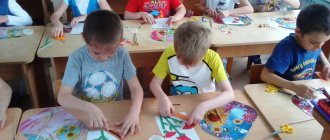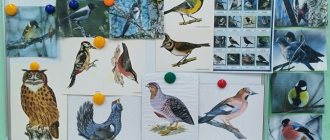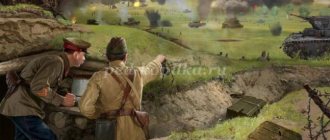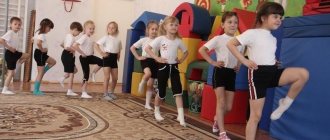The essence of preparing a calendar plan for a thematic week for Victory Day for the middle group
The mission of planning a theme week is to:
- selecting methods and techniques for working with children that help reveal the essence of the “Victory Day” theme in the most accessible way - for example, for children in the middle group, a visual display technique will be productive, that is, watching multimedia presentations, excerpts from films;
- determining appropriate forms of interaction with preschool children (in the middle group the emphasis is on joint work with adults);
- compiling a list of objects of the subject-development environment that will contribute to understanding the topic (for example, joint creation of lapbooks on the topic with parents, publication of wall newspapers, etc.).
The subject-development environment creates the necessary surroundings, helps to tune in to studying the topic, and also organizes materials for educational activities and matinees.
The objectives of planning a thematic week are:
- methodologically justified distribution of the studied material according to the forms of organizing interaction with children - for example, expanding ideas about military professions can be organized through guessing riddles while walking;
- determining the goals of each type of work in the context of a specific type of educational activity - for example, in a lesson on speech development to achieve the goal of expanding ideas about the holiday and events of the Second World War, the plan includes a conversation based on an information block with a short story about the Second World War;
- a brief formulation of the content of a particular type of work, for example, the conditions of the game “Cavalry” in a physical education lesson can be formulated as follows: “children jump, sitting on a ball, from one pin to another and back”;
- logical composition of the week - at the beginning - NOD, organization of project work, excursions, etc., and at the end - a matinee or concert.
The matinee is the final event of the thematic week
Components of the thematic week calendar plan
Regardless of the group for which the plan is drawn up, it includes all types of organization of interaction with children:
- GCD in educational areas - familiarization with the outside world, FEMP, speech development, physical education, drawing, music, modeling/appliqué;
- excursions, visiting a museum, library;
- routine moments - for example, before going for a walk, children practice the speed of putting on their shoes, imagining themselves as soldiers during a combat alert;
- leisure activities - matinee, sports festival.
In addition, the plan organizes types of work according to methods of interaction:
- working together with an adult;
- independent work of children;
- cooperation with parents.
“Your feat is forever in our hearts” project in the preparatory group
Authors:
Kirilova Marina Anatolyevna, teacher
Russkikh Nadezhda Sergeevna, teacher
MADO kindergarten No. 87 in Tyumen
Project for the 75th anniversary of the Great Victory “We remember, we are proud...” for the preparatory group of the kindergarten
Topic: “Your feat is forever in our hearts”
There is no family in Russia where its hero is not remembered.E. Agranovich
By dominant activity: cognitive, creative, research, gaming;
By the number of participants: group (children 6-7 years old, teachers, parents);
Nature of contacts: among children of the same group;
By duration: - short-term (2 weeks from 04/27/2021 to 05/08/2020).
Problem:
Currently, the continuity of generations in raising children, and above all in the sphere of passing on moral experience, is being disrupted. Our children do not feel proud of their Motherland, of the heroes of the winners in the Great Patriotic War.
Children, starting from preschool age, know little about the feat of the Russian people in the fight against fascism during the Great Patriotic War. Often they don’t even know when and with whom our people fought. The system of working with parents on the problem of moral education in the family is not sufficiently formed.
Relevance:
Patriotic education of children is one of the main tasks of a preschool institution.
Patriotic education of a child is a complex pedagogical process. It is based on the development of moral feelings. Preschool age is the period when the prerequisites for civic qualities are laid. The project is designed to contribute to the formation of a sense of patriotism, respect for the heroic past of our Motherland, and teaches to value peace.
| Problem | Target |
| Insufficient knowledge of children about the Great Patriotic War, about war heroes and their exploits, about children of war, about the holiday of May 9 and its meaning, about the symbols of Victory Day, about WWII veterans. Insufficient formation of feelings of patriotism, a sense of pride in one’s people, their military merits in the Great Patriotic War. Children's understanding of how the feats of the people and war heroes are remembered by living people is not formed. | Expanding the knowledge of senior preschool children about the Great Patriotic War, about war heroes and their exploits, about children of war, about the holiday of May 9 and its meaning, about the symbols of Victory Day. Formation of civil and patriotic feelings in preschool children, instilling a sense of pride in the feat of their people in the Great Patriotic War, respect for veterans. |
| Causes | Tasks |
| · There is not enough information on the topic for children in kindergarten and at home; · Insufficient attention is paid to the educational program for d/s. | Select material and conduct educational activities, conversations, productive activities on the topic; Create a card index of games, poems, works; Organize a sports festival dedicated to the celebration of May 9; Make a model of the “Walk of Fame of War Heroes”; With the help of the group’s parents, select materials and make a stand “No one is forgotten, nothing is forgotten”, organize an exhibition of joint works with children “We remember, we are proud”; Select material and conduct a consultation for parents “Tell your children about the Great Victory”; Select and arrange the folder – movement “This Victory Day” Select material and hold a reading competition dedicated to Victory Day “We remember, we are proud” |
Target:
Formation and expansion of knowledge of senior preschool children about the history of the Great Patriotic War, about war heroes and their exploits, about children of war, about the holiday of May 9 and its meaning, about the symbols of the Victory Day.
Tasks:
To form and expand children's knowledge about the history of the Great Patriotic War;
To form and expand children's knowledge about war heroes and their exploits, about children of war, about the symbols of the Victory Day, about the May 9th Holiday and its meaning;
To form children’s concepts of how the feats of the people and war heroes are remembered by living people;
To form feelings of pride in one’s people, their military achievements, and feelings of patriotism;
To cultivate respect for the defenders of the Fatherland, for the memory of fallen soldiers, and WWII veterans;
Develop children's speech, enrich their vocabulary by listening to songs on military themes, memorizing poems, reading fiction about war;
Continue to develop creative abilities within the framework of the project;
Continue to expand cooperation with parents of students.
Stages of work on the project:
Preparatory stage:
Teacher:
Determining the theme of the project.
Formulation of the goal and breakdown into a range of tasks.
Drawing up a plan for the main stage of the project.
Survey of preparatory group children. Identification of children’s initial knowledge about the war and the Victory Day
Selection of literature, presentations, photographs, posters.
Parents:
Information from parents about the upcoming project. Involving parents to participate in the project.
Children:
entry into the project.
Main stage:
- Reading fiction about the war: S Alekseev “Bear”, “Evil Family”, “Tanya Savicheva”, “Bronze rose to the sky”
- Conducting educational activities, conversations about the Second World War, victory in the war.
- Conversations: “Eternal Flame”, “History of the St. George Ribbon”, “Symbols of Victory - orders, medals, banners”
- Listening to musical works: “Holy War”, “Victory Day”, “Do Russians want war”, “Oh dears...”
- Artistically creative activities: drawing (with paints) “Eternal Flame”, designing from paper “Dove of Peace”, modeling “Military equipment - T34 tank”, application “Congratulations on May 9”, collective production of the model “Walk of Fame of War Heroes”, individual lesson sculpting “Monument of Memory”
- Memorizing poems for the recitation competition dedicated to Victory Day “We remember, we are proud”
- Creation of a card index of games, poems, works;
- Organization of plot-role-playing, didactic and outdoor games.
- Organization of a sports festival dedicated to the celebration of May 9;
- With the help of the parents of the group, selection of material and production of the stand “No one is forgotten, nothing is forgotten”, organization of an exhibition of joint works with children “We remember, we are proud”;
- Consultation for parents “Tell your children about the Great Victory”;
- Design of the folder – movement “This Victory Day”
The final stage:
Survey of children: “What new have you learned about Victory Day?”
Sports festival dedicated to the celebration of May 9
Reading competition dedicated to Victory Day “We remember, we are proud”
Broadcast of the project results (available for viewing by teachers, children and parents)
Work competition on the theme “We remember, we are proud” together with parents.
Exhibition of works (sculpting) “Military equipment - T34 tank”
Layout of the “Walk of Fame of War Heroes”
Stand “No one is forgotten, nothing is forgotten”
Greeting cards for Victory Day.
Expected result:
- the formation and development of interest in the history of one’s country, in the Great Patriotic War, a conscious manifestation of respect for the merits and exploits of the people and heroes - warriors in the Great Patriotic War.
- parents' awareness of the importance of patriotic education of preschool children.
Project implementation activities in honor of Victory Day.
Cognitive development
NOD “We are faithful to this memory”
(using ICT)
Goal: introducing children to the heroic pages of Russian history. Tasks:
To introduce the events of the Great Patriotic War, the feats of soldiers, people of all nationalities.
Talk about children of war, the role of children's heroism during the Second World War
To develop knowledge about how people defended their country from fascist invaders.
Conversation “Eternal Flame”
Goal: to develop in children patriotic feelings and ideas about heroism, about how living people preserve the memory of war heroes.
Objectives: to cultivate love and respect for the defenders of the Motherland on the basis of vivid impressions and historical facts. To instill in children such moral qualities as love for their loved ones, a sense of pride in family members who survived the Great Patriotic War or died on the battlefields..
Conversation "The History of the St. George's Ribbon."
Goal: Expand children's understanding of the symbols of Victory Day, tell about the history of the St. George ribbon, cultivate interest and respect for the historical past of their homeland.
Objectives: To introduce children to the symbol of the Victory Day - the St. George's Ribbon, its history, and meaning.
To expand children's knowledge about the history of the Second World War, to cultivate love and respect for the defenders of the Motherland on the basis of vivid impressions and historical facts. To develop moral qualities in children.
- Conversation: “Symbols of Victory - orders, medals, banners”
Goal: To familiarize children with the military awards that were awarded to soldiers during the Great Patriotic War, with the Victory Banner that was hoisted over the Reichstag
Objectives: To introduce children to the military awards that were awarded to soldiers during the Great Patriotic War, to the Victory Banner that was hoisted over the Reichstag, to cultivate respect for the military exploits of soldiers and commanders, pride in their people, and love for the Motherland.
To expand children's knowledge about the history of the Second World War, to cultivate love and respect for the defenders of the Motherland on the basis of vivid impressions and historical facts. To develop moral qualities in children.
Artistic and aesthetic development.
- Drawing with paints Theme: “Eternal Flame”
Goal: Formation of children's ideas about the Great Patriotic War, the feat of the Russian people, education of patriotism by drawing (images of the monument).
Tasks:
To form children’s ideas about the Great Patriotic War by encouraging children to independently depict their impressions in drawings, using previously acquired knowledge and skills
Develop the ability to perceive drawings and analyze them.
Strengthen the techniques of painting with paints using the entire brush and its tip.
- Modeling (Ind.) Theme: “Monument of Memory”
Goal: to develop in children patriotic feelings and ideas about heroism, about how living people preserve the memory of war heroes.
Objectives: To foster patriotic feelings - love for the Motherland and pride in the Fatherland. Cultivate respect for the past. Strengthen children's ability to depict several objects united by a common content and logically connected to each other. Practice and consolidate various sculpting techniques (from a whole piece and in parts). Develop creativity.
— NOD “Letters of War”
Target:
To form children’s patriotic feelings based on familiarization with letters from the front.
Objectives: Teach children to express their feelings. Enrich your vocabulary. Develop coherent speech.
- Modeling "Military equipment - tank T - 34"
Goal : Expanding children's knowledge about the history of the Great Patriotic War, military equipment using the example of the T34 tank through productive activities (modeling)
Tasks:
To clarify children’s knowledge about types of transport: air, land, water, special, passenger; children's knowledge about military transport. Continue to form children's ideas about military equipment. Introduce children to military transport: tanks: self-propelled gun SU-100, T-27 wedge, KV-85 heavy tank, KV-2 heavy tank, T-34 medium tank, T-35 heavy tank, IS-1 heavy tank
Improve skills in conveying the image seen (T34 tank) through productive activities (sculpting)
Strengthen the ability to sculpt an object (T34 tank) from individual parts, correctly convey their shape and proportions.
- Application
Topic: “Congratulations on the holiday of May 9. Postcard."
Goal: Expanding children's knowledge about the May 9 holiday, developing children's artistic taste, developing creative potential through various types of activities.
Tasks:
To consolidate in children the ability to create a plot composition by independently using mastered cutting techniques with scissors
Strengthen children's skills in working with paper.
Develop compositional skills - place cut out elements in accordance with the plot.
Productive activity.
- Paper construction “Dove of Peace”
Goal: Formation of the concept of “Dove of Peace” in children, the meaning of this symbol.
Objectives: Continue to develop design abilities and independence in distributing actions among themselves. Continue to learn how to play up your work. Foster collectivism.
- Collective production of the model “Walk of Fame of War Heroes”
Goal: Collective creation of a model of the “Walk of Fame of War Heroes” from paper and natural materials. Objectives : Expanding knowledge about the history of the Second World War, the feat of heroic warriors; Forming the need for creative work. Development of design and technological thinking.
- Music.
- Listening to musical works: “Holy War”, “Victory Day”, “Do Russians want war”, “Oh dears...”, “Where the Motherland begins...”
Goal : developing a sense of pride in one’s people, their military achievements;
Tasks:
To consolidate the idea of the Victory Day holiday;
To cultivate respect for the defenders of the Fatherland, the memory of fallen soldiers, and WWII veterans.
Speech development
- Reading fiction about the war: S Alekseev “Bear”, “Evil Family”, “Tanya Savicheva”, “Bronze rose to the sky”
Goal: Formation of children's ideas about the Great Patriotic War, the feat of the Russian people, education of patriotism using the example of fiction.
Tasks:
Continue to teach children to listen to works, empathize with the characters, and answer questions about what they read.
- Memorizing poems for the recitation competition dedicated to Victory Day “We remember, we are proud”
“Victory Day”, “Obelisks”, “At the obelisk”, “What is Victory Day?”, “Let children not know war”, “For the dead and the living”, “Grandfather’s story”,
Goal: Formation of children's ideas about the Great Patriotic War, the feat of the Russian people, education of patriotism using the example of fiction.
Tasks:
Continue to teach how to read poetry loudly with feeling and expression.
Watching the cartoon “Boy - Kibalchish”, watching feature films about the war together.
Goal: to form a patriotic attitude towards the defenders of the Motherland.
Learning proverbs, sayings and riddles about the courage and resilience of defenders.
Physical development
- Sports festival dedicated to the celebration of May 9
Goal: Expanding children's knowledge about the history of the Second World War and the holiday of May 9 through various activities
Tasks:
To form a sustainable interest in performing physical exercises, to develop basic physical qualities.
Foster determination, perseverance and a sense of camaraderie during collective relay races.
To cultivate a sense of respect for the defenders of our Motherland, love for the Motherland.
- Outdoor games
"Raft Crossing"
(medium mobility game)
Goal: development of balance, speed, attention, ability to act in a team
“Relay race “Military Fortress”.
Objectives: Consolidating the ability to act on a signal, developing orientation, the ability to act in a team, developing speed and attention.
"Scouts" (high mobility game)
Goal: developing the ability of children to crawl on their bellies, on low all fours with support on their forearms, developing speed, attention, and the ability to act in a team.
Social and communicative development
Story-role-playing game “Warriors – Border Guards”
Goal: to develop preschoolers’ ideas about border guard soldiers and their feats during the war in the name of their Motherland through a role-playing game.
Tasks:
To promote military and patriotic training of preschool children. Continue to develop the ability to creatively develop the plot, role-playing interaction in the game, and the ability to conduct dialogue.
Develop speed, agility, endurance, accuracy, balance, strength. To cultivate in children courage, endurance, and friendly relationships.
- Role-playing game "Sailors"
Goal: To form preschoolers’ ideas about border guard soldiers and their feats during the war in the name of their Motherland through a role-playing game.
Tasks:
To promote military and patriotic training of preschool children. Continue to develop the ability to creatively develop the plot, role-playing interaction in the game, and the ability to conduct dialogue.
Develop speed, agility, endurance, accuracy, balance, strength. To cultivate in children courage, endurance, and friendly relationships.
Foster friendly relationships and a sense of teamwork.
- Didactic games “Whose uniform”, “What has changed”, “Military equipment”
Tasks:
Consolidate knowledge about the military profession, military equipment, develop attention and logic.
Board game: "Battleship"
Tasks:
Develop attention and logical thinking.
Working with parents
Goal: To make parents aware of the importance of patriotic education of preschool children
- Making a stand “No one is forgotten, nothing is forgotten”, organizing an exhibition of joint works with children “We remember, we are proud”;
- Consultation for parents “Tell your children about the holiday of May 9”
Goal: enriching children's ideas about the Great Patriotic War, about heroes, home front workers, war veterans, through the joint activities of parents and children in the family.
- Design of the folder – movement “This Victory Day”.
- Pedagogical living room “Heroes of the Tyumen land” presentation.
Goal: To create a sense of pride in their compatriots.
- Quest - game "On the Roads of War".
Goal: To form a patriotic attitude while getting acquainted with the military traditions of our people.
- Album design "Immortal Regiment".
Goal: To create a sense of pride for the people who won the war.
Conclusion.
During the events dedicated to Victory Day, children’s experience in the field of social education was enriched through the use of various methods and techniques, knowledge about the Great Patriotic War, the symbols of the Victory Day, the May 9th Holiday and its meaning was expanded and systematized. Children developed a respectful attitude towards war participants and home front workers; careful handling of family photographs and heirlooms. The skills of productive and artistic activities were consolidated in making the model “Walk of Fame of War Heroes”, in designing the “Dove of Peace”, in sculpting “Military Equipment”, in the application “Congratulations on May 9”, and in painting with “Eternal Flame” paints. Communication skills were developed and strengthened, the vocabulary was enriched, coherent, monologue and dialogic speech developed during conversations and educational activities. During the sporting events, the ability to act collectively was formed, physical skills were developed in the s/r/games “Warriors - Border Guards”, “Sailors”, Quest - the game “On the Roads of War”.
Methodological literature used:
-Aleshina N.V. Patriotic education of preschool children: methodological recommendations / N.V. Aleshina. – M.: TsGL, 2005. – 205 p.
-Veraksa N. E. Project activities of preschool children: a manual for teachers of preschool institutions / N. E. Veraksa, A. N. Veraksa. – M.: MOSAIKA-SYNTHESIS publishing house, 2008. – 112 p.
-Kondrykinskaya L.A. For preschoolers about the defenders of the Fatherland: a methodological guide to patriotic education in preschool educational institutions. L. A. Kondrykinskaya. – M.: TC Sfera, 2006. – 192 p.
-Nechaeva V.G., Makarova T.A. Moral education in kindergarten [text]: for teachers of preschool institutions / V.G. Nechaeva, T.A. Makrova - M.: Education, 1984. - 272 p.
-A. P. Kazakova, T. A. Shorygina “To children about the Great Victory” Moscow 2010 T. A. Shorygina “Victory Day” Moscow 2010
“Evidence of publication in the media” Series A No. 0007609, 0007610
We invite teachers of preschool education in the Tyumen region, Yamal-Nenets Autonomous Okrug and Khanty-Mansi Autonomous Okrug-Yugra to publish their teaching materials: - Pedagogical experience, original programs, teaching aids, presentations for classes, electronic games; — Personally developed notes and scenarios of educational activities, projects, master classes (including videos), forms of work with families and teachers.
Why is it profitable to publish with us?
1. “Kindergartens of the Tyumen Region” is an officially registered specialized media outlet at the federal level. 2. The activities of the editorial office are supported by the Department of Education and Science of the Tyumen Region 3. We issue a “Certificate of Publication” in the media. 4. The document has a unique number, is entered in the register, has the original seal of the editorial office of the online publication and signature. 5. “Certificate of publication” in the media is sent to the author in both paper and electronic versions.
Details >>>
Sample “Certificate of publication of author’s methodological material in the media.”pdf
Share
Basic principles for creating a theme week plan
The principles for drawing up a plan for the week are:
- optimality, that is, maintaining the ratio of the volume of material to be studied and the age of the children (for example, a matinee in the middle group lasts no more than 40 minutes, which presupposes a clear timing of the performances);
- taking into account development level indicators common to the children of the group (if there are more children in the group with an object-figurative type of perception, then the plan needs to include more tasks for productive activities - modeling, appliqué, and if with a visual-figurative type, then the emphasis can be placed on theatrical games , conversations);
- a combination of joint and independent work - the guys can summarize a conversation in the afternoon on the topic of home front workers with a drawing based on their impressions of it;
- integration of all educational areas - cognition, socialization, communication, creativity, physical development;
- focus on changing the level of children's performance during the day - in the morning, educational activities, matinee rehearsals, excursions are planned, and in the second - reading fiction, organizing independent activities;
- correlation, that is, the weekly plan is completely in tune with the calendar-thematic one, which, in turn, is compiled according to the long-term plan.
Materials and forms of work according to the weekly plan should be understandable to children



